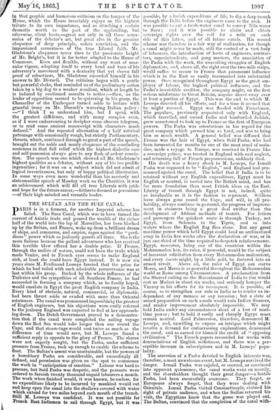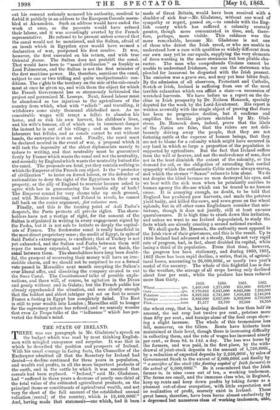THE SULTAN AND THE SUEZ CANAL.
PARIS is in a ferment, for another Imperial scheme has failed. The Suez Canal, which was to have turned the current of Asiatic trade and poured the wealth of the richer half of the world into the lap of Marseilles, has been blocked up by the Sultan, and France, woke up from a..brilliant dream of ships, and commerce, and empire, rages against the " perfi- dious " power which so jealously guards all three. She is the more furious because the gallant adventurer who has received this terrible blow offered her a double prize. If France, through the malice of nature, could not have the trade which made Venice, and to French eyes seems to make England rich, at least she could have Egypt instead. It is now six years since M. Ferdinand Lesseps fancied that the prize for which he had toiled with such admirable perseverance was at last within his grasp. Backed by the whole influence of the Tuileries and the sympathies of all Southern France, he had succeeded in forming a company which, as he fondly hoped, would emulate in Egypt the great English company in India. Every kind of obstacle, natural, commercial, or diplomatic, had been thrust aside or evaded with more than Oriental astuteness. The canal was pronounced impossible by the greatest of English engineers, but his objections were easily referred to the jealousy England was expected to feel at her approach- ing doom. The Dutch Government proved to a demonstra- tion that if the canal were completed the sailing voyage down the Red Sea would take longer than one round the Cape, and that steam-tugs would cost twice as much as the difference of time would save, but M. Lesseps found a sufficient reply in appeals to the glory of France. The shares Were not eagerly sought, but the Pasha, under sufficient pressure from France, took up enough to enable the scheme to float. The Sultan's assent was unattainable, but the powers of a hereditary Pasha are considerable, and exceedingly ill defined, and permission was given on the spot to commence the work in "anticipation of sanction." Labour was hard to procure, but Said Pasha was despotic, and the peasants were ordered to furnish twenty thousand unpaid labourers a month. The work when finished would, it was known, be useless, for no expenditure likely to be incurred by mankind would cut and keep open the canal into the shallows covered with water which extend for two miles beyond each mouth of the trench. Still M. Lesseps was confident. It was not possible for French East Indiamen to sail through Egypt, but it was possible, by a lavish expenditure of life, to dig a deep trench through the Delta before the engineers came to the rock. It was possible to cut a fresh-water canal to convey Nile water to Suez ; and it was possible to claim and obtain sovereigu rights over the soil for a mile on each side of this latter, and of all future canals. His second scheme was therefore in a fair way of realization, for though a canal might never be made, still the control of a vast body of labourers, the introduction of hosts of engineers, contrac- tors, superintendents, and gang masters, the association of the Pasha with the work, the unavailing struggles of English diplomatists, and, above all, the right over the two-mile strips, would suffice to secure to France that paramount influence which is in the East so easily transmuted into substantial power. Once recognized throughout Egypt as the great em- ployer of labour, the highest political influence, and the- Pasha's irresistible creditor, the company might, on the first serious misfortune to Great Britain, acquire direct sway over at least a portion of Egypt. This was the end to which M. Lesseps directed all his efforts, and for a time it seemed that he might succeed. Egypt was flooded with Frenchmen. The populace, previously acquainted only with England, which travelled, and owned India and bombarded Jeddah, grew accustomed to look up to France as the first of European powers. The Pasha was ostentatious in his regard for the great company which pressed him so hard, and was to bring him so much wealth. A general belief was diffused that France was the heir of Egypt, when Said Pasha, who had been tormented for months by one of the most cruel of mala- dies, made a voyage to Europe, was received in France like a sovereign prince, was treated in England with cool neglect, and returning full of French prepossessions, suddenly died.
His death was a heavy shock to M. Lesseps, for Ismail Pasha was siipposed to be "English," and England had pro- nounced against the canal. The belief that if India is to be retained without any English expenditure, Egypt must be English or neutral, is rooted into the British mind, and has far more foundation than most Eritish ideas on the East. Liberty of transit through Egypt is not, indeed, quite so invaluable as it is the fashion to represent. Soldiers have always gone round the Cape, and will, in all pro- bability, always continue to go round, the progress of improve- ment in steamers being a great deal swifter than the development of African methods of transit. For letters and passengers the quickest route is through Turkey, not Egypt, from Seleucia to the Tigris, and so into waters where the English flag flies alone. But any great maritime power which held Egypt could land an acclimatized army in India five weeks after the declaration of war, or in just one-third of the time required to despatch reinforcements. Egypt, moreover, being one of the countries within the Mohammedan ken, its ruler, if powerful, would be the subject of incessant solicitation from every Mohammedan malcontent, and every'entente might, by a little gold, be fostered into an armed revolt. Above all, the ruler of Egypt can starve Mecca, and Mecca is as powerful throughout the Mohammedan world as Rome among Ultramontanes. A proclamation from the Shereef calling on the Mussulmans of India to rise would cost us Madras in about six weeks, and seriously hamper the Viceroy in his efforts for its reconquest. It is possible, of course, so to strengthen our rule in India as to render us in- dependent of any menace or any invasion ; but a state of armed preparation on such a scale would ruin Indian finances, and render improvement absolutely impossible. We may hold India under any circumstances short of a loss of mari- time power ; but to hold it easily and cheaply Egypt must remain neutral. Lord Palmerston, therefore, denounced M. Lesseps, and, unwilling to expose an intrigue which might involve a demand for embarrassing explanations, denounced the canal, and so earned for himself the credit of " opposing civilization." The French papers resounded for weeks with denunciations of English selfishness, and there was a per- ceptible increase in subscriptions and in M. Lesseps' popu- larity.
The accession of a Pasha devoted to English intc.rests was, therefore, a most unwelcome event, but M. Lesseps survived the danger. Ismail Pasha was cajoled, or coerced, or convinced into apparent quiescence, the canal works went on merrily, and the shareholders thought their great danger—a hostile Pasha, had been successfully overcome. They forgot, .as Europeans always forget, that they were dealing with Orientals. Ismail Pasha visited Constantinople, claimed his right of private audience, and when the Sultan returned his visit, the Egyptians knew that the game was played out The Sultan, convinced that the completion of the canal with- out his consent seriously menaced his authority, resolved to forbid it publicly in an address to the European Consuls assem- bled at Alexandria. Such an address would have ended the work at once, as the peasants would have refused their labour, and it was accordingly averted by the French representative. He refused to be present unless assured that the canal would not be mentioned, and the Sultan, afraid of an insult which in Egyptian eyes would have seemed a declaration of war, postponed his first resolve. It was, however, the first executed on his return, and with true Oriental finesse. The Sultan does not prohibit the canal. That would have been to "assail civilization" as frankly as Lord Palmerston, and the Sultan is not the first minister of the first maritime power. He, therefore, sanctions the canal, subject to one or two trifling and quite unobjectionable con- ditions. The r:ghts to the territory on the side of the sub-canals must at once be given up, and with them the object for which the French Government has so strenuously befriended the project and patronized M. Lesseps. Next, forced labour must be abandoned as too injurious to the agriculture of the country from which, what with "reliefs" and travelling, it withdraws some sixty thousand ablebodied men. As no conceivable wages will tempt a knelt to abandon his home, and so risk his own harvest, his children's lives, and his wife's honour, all of which are in imminent danger the instant he is out of his village; and as there are no labourers but fellahs, and as canals cannot be cut without hands, the enterprise is at an end. Finally, the canal must be declared neutral in the event of war, a proposal which it will task the ingenuity of the ablest diplomatists merely to reduce to writing, and that neutrality must be guaranteed firstly by France which wants the canal and not the neutrality, and secondly by England.which wants the neutrality butnot the the canal. The proposals are fatal, yet they contain nothing to which theEmperor of the French can object. Is the "protector of civilization" to insist on forced labour, or the defender of nationalities to deny the right of the Egyptians to their own property, or the ally of England to murmur because asked to agree with her in guaranteeing the humble ally of both ? The Emperor cannot for very shame take up such ground, and with Mexico resisting, and Poland in revolt, he cannot fall back on the easier argument, flat voluntas mea.
Finally, and this is the turning point of Aali Pasha's despatch, the Porte protects all private rights. The share- holders have not a vestige of right, for the consent of the Sultan is stipulated in writing in every engagement signed by the Pasha, but it is not safe to irritate so deeply the capital- ists of France. The freshwater canal is really beneficial in the most direct proprietary sense; the credit of Egypt, in spite of Said Pasha's extravagance, is excellent; that of Turkey is not yet exhausted, and the Sultan and Pasha between them will repay the money expended, and "finish," or not finish, the canal between them. The shareholders have long been doubt- ful, the prospect of recovering their money will have an irre- sistible charm, and we should not be surprised to see a formal vote passed in Marseilles next month accepting the Sultan's over liberal offer, and dissolving the company created to cut the Suez Canal. The Constitutionnel talks of possible expla- nations, and there will, of course, be agitation in the Divan and gossip without end in Galata; but the French public has already apprehended the situation, and sees clearly enough that the boldest and ablest intrigue yet set on foot to secure France a footing in Egypt has completely failed. The East is still to pour wealth into London ; Marseilles still to hunger for the supremacy natare has refused; and we scarcely wonder that even Le Temps talks of the " influence " which has per- verted the Sultan's mind.































 Previous page
Previous page